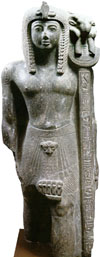The Princess of Bekhten
The Preface
In the reign of Rameses III, a large temple was built at Thebes in honor of the Moon-god Khonsu. According to a tradition which his priests in later times inscribed on a stone stelae, the fame of his Theban representative was so widespread that it reached a remote country called Bekhten.

A king of Egypt (probably Rameses III) was in the country of Nehern (a portion of Western Syria near the Euphrates), collecting tribute according to an annual custom, when the prince of Bekhten came with the other chiefs to salute his majesty and to bring a gift. The other chiefs brought gold, and lapis-lazuli, and turquoise, and precious woods, but the prince of Bekhten brought with his offerings his eldest daughter, who was exceedingly beautiful; the king accepted the maiden, and took her to Egypt, where he made her the chief royal wife and gave her the name of Ra-neferu i.e., the "beauties of Ra", the Sun-god.
Some time after, in the fifteenth year of the reign of the king of Egypt, the prince of Bekhten appeared in Thebes on the 22nd day of the second month of summer, and when he had been led into the presence he laid his offering at the feet of the king, and did homage to him. As soon as he had the opportunity he explained the object of his visit to Egypt, and said that he had come on behalf of the young sister of Queen Ra-neferu, who was grievously sick, and he begged the king to send a physician to see his daughter Bent-Reshet, or Bent-enth-reshet. Thereupon the king summoned into his presence all the learned men of his court, and called upon them to choose from among their number a skilled physician that he might go to Bekhten and heal the Queen's young sister; the royal scribe Tehuti-em-beb was recommended for this purpose, and the king at once sent him off with the envoy from Bekhten to that country. In due course he arrived there and found that the princess of Bekhten was under the influence of some evil spirit, which he was powerless either to exorcise or to contend with in any way successfully. When the king of Bekhten saw that his daughter was in no way benefited by the Egyptian scribe, he dispatched his envoy a second time to Egypt with the petition that the king would send a god to heal his daughter, and the envoy arrived in Thebes at the time when the king was celebrating the festival of Amon.
As soon as the king, had heard what was wanted he went into the temple of Khonsu Nefer-hetep, and said to the god, "0 my fair Lord, I have come once again into thy presence [to entreat] thee on behalf of the daughter of the Prince of Bekhten"; and he entreated him to allow the god Khonsu to go to Bekhten, and said, "Grant that thy magical (or saving) power may go with him, and let me send his divine Majesty into Bekhten to deliver the daughter of the Prince of that land from the power of the demon."
The king of Egypt dispatched Khonsu to Bekhten, where the god arrived after a journey of seventeen months. As soon as he had been welcomed to the country by the Prince of Bekhten and his generals and nobles the god went to the place where the princess was, and he found that Bent-reshet was possessed of an evil spirit; but as soon as he had made use of his magical power the demon left her and she was healed straightway. Then that demon spoke to Khonsu , and acknowledged his power, and having tendered to him his unqualified submission he offered to return to his own place; but he begged Khonsu to ask the Prince of Bekhten to make a feast at which they both might be present, and he did so, and the god, and the demon, and the Prince spent a very happy day together. When the feast was concluded the demon returned to his own land, which he loved, according to his promise.
As soon as the Prince recognized the power of Khonsu he planned to keep him in Bekhten, and the god actually tarried there for three years, four months, and five days, but at length he departed from his shrine and returned to Egypt in the form of a hawk of gold. When the king saw what had happened, he spoke to the priest, and declared to him his determination to send back to Egypt the chariot of Khonsu, and when he had loaded him with gifts and offerings of every kind the Egyptians set out from Bekhten and made the journey back to Thebes in safety. On his return Khonsu took all the gifts which had been given to him by the Prince of Bekhten, and carried them to the temple of Khonsu Nefer-hetep, where he laid them at the feet of the god. Such is the story which the priests of Khonsu under the New Empire were wont to relate concerning their god "who could perform mighty" deeds and miracles, and vanquish the demons of darkness."
Editor's Note: this myth was taken more or less directly from The Gods of the Egyptians by E.A. Wallis Budge.
Digg This!
![]() Del.icio.us
Del.icio.us
![]() Stumble Upon
Stumble Upon
